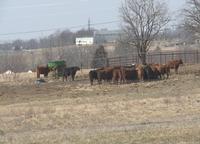NOBULL: Humane Society of the US in Columbia to Promote Sustainable Farming
Humane Society of the US in Columbia to Promote Sustainable Farming
Posted on 20 March 2014 at 3:47pm
COLUMBIA – The Humane Society of the United States proposed new sustainable food policies at the "How We Eat, How We Farm" panel discussion Thursday.
Local and national experts urged participants to support sustainable agricultural farming techniques and to get involved in the fight against factory farms.
Factory farms began in the 1960s under large corporations and many use concentrated animal feeding operations or CAFOs. The common CAFOs are for chickens, cattle and hogs.
The FDA has not linked CAFOs or factory farming with any health or environmental effects but did ask farmers to lessen the amount of antibiotics they give to animals.
Dr. John Ikerd writes about sustainable farming and is a retired professor of Agricultural and Applied Economics at the University of Missouri. Ikerd used to support the industrialization of farming when there weren’t enough farmers for the food demand, but now that’s not the case.
"We’ve got epidemics of obesity, diabetes, heart disease, high blood pressure, various cancers, that are associated directly to the American diet which comes out of the industrialized food system. So that system’s been a failure. We don’t have a choice. We need to rebuild the system," explained Ikerd.
But according to Cargill’s website, one of the largest meat producers in the country, they "take issues of animal welfare, safety and sanitary operations very seriously" and have strict requirements for their operations.
Joe Maxwell is VP of Outreach and Engagement for the Humane Society of the United States. He’s also a farmer who supports sustainable farming. Maxwell said large corporations have hurt American Farmers.
"Cargill and other corporations want to own their animals from day one and put them through the CAFO system. It’s proved to destroy land and waterways. Look at Iowa, that’s why they’ve come to northern Missouri for their next 200 hog farms," said Maxwell.
The HSUS and experts want local grocery stores, restaurants and people to recognize this problem and turn away from factory farm purchases. The HSUS created a five-step process called "Global Animal Partnership," or GAP, which ensures the animals are fed, cared for and left to roam on the fields.
